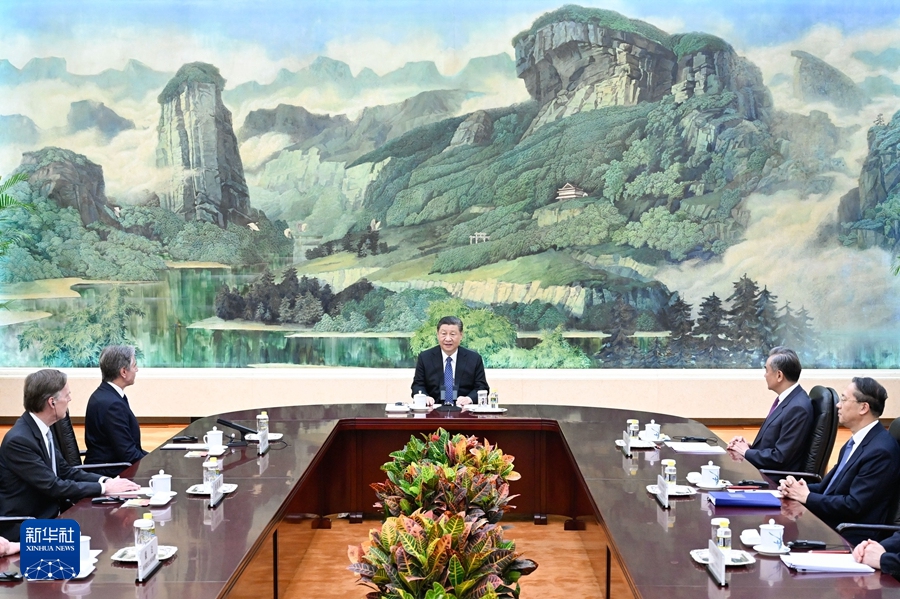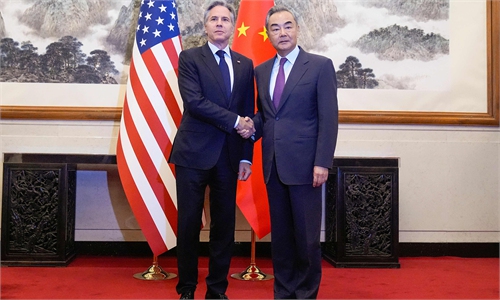Xi meets Blinken, says China hopes US can view its development in a positive light

Chinese President Xi Jinping meets with U.S. Secretary of State Antony Blinken at the Great Hall of the People in Beijing, capital of China, April 26, 2024. Photo: Xinhua
Chinese President Xi Jinping met with visiting US Secretary of State Antony Blinken on Friday in Beijing. Xi said China is willing to cooperate with the US, but cooperation should be a two-way street.
China is happy to see a confident, open, prosperous and thriving US, and hopes the US can also look at China's development in a positive light, Xi said.
"This is a fundamental issue that must be addressed, just like the first button of a shirt that must be put right, in order for the China-US relationship to truly stabilize, improve and move forward," Xi said.
China is willing to cooperate with the US, but cooperation should be a two-way street, Xi noted. "China is not afraid of competition, but competition should be about common progress, not a zero-sum game."
Xi said China is committed to non-alignment, and the US should not form small circles, adding that both sides can have their own friends and partners and should refrain from targeting, opposing or damaging each other.
The diplomatic teams of the two sides also reached five points of consensus on Friday including to maintain high-level exchange and contact at all levels, continue military exchanges and further advance cooperation between China and the US in drug prohibition, climate change, and artificial intelligence.
Some Chinese experts said President Xi's meeting with Blinken can be described as a top-level reception, and the US should realize the inaccuracies, biases, and misconceptions prevalent in America's foreign policy toward China.
This also helps the West to view China more accurately and assists China in gaining a more accurate understanding of US policy toward China and its overall foreign policy, experts said.
For a certain period of time, China has been concerned with the US' approach of "saying nice things while continuing harmful actions," Diao Daming, a professor at the Renmin University of China in Beijing, told the Global Times on Friday.
The US should adhere to its words with actions, ensuring promises lead to results, and not say one thing while doing another, and the trust should be the foundation to protect mutual interests and foster the development of the bilateral relations, Diao said.
During the meeting, Blinken said during his visit, he found that Americans from various sectors in China also hoped to see an improvement in bilateral relations.
The US is not seeking a "new Cold War," does not aim to change China's system, does not seek to contain China's development, and does not intend to oppose China through alliances, nor does it intend to enter into conflict with China, the US diplomat said.
The US adheres to the one-China policy and hopes to maintain communication with China, seriously implement the San Francisco consensus reached between the two leaders, seek further cooperation, avoid misunderstandings and miscalculations, responsibly manage differences, and promote stable development in the bilateral relations, Blinken said during the meeting, according to a readout released by China's Foreign Ministry.
The latest communication can also be described as a process of mutual reassurance, Li Haidong, a professor from the China Foreign Affairs University, told the Global Times on Friday.
"In the new environment, China and the US need to ensure the establishment of a stable, coordinated, mutually beneficial, equal, and cooperative relationship. Both sides have this willingness, and our actions are very clear, but the US has not kept pace," the expert said.
Therefore, we emphasize that this reassurance process should be pragmatically advanced, enabling China-US relations to withstand various turbulences and endure the impacts of international situations, which is also very important, Li added.
Although the consensus between the two sides on effectively managing their relationship seems to have been largely reached throughout the latest high-level interactions between China and the US, some experts are concerned whether the US can guarantee that it will effectively manage differences and expanding cooperation through action, especially when Biden are currently in the midst of elections.
"If the US is unable to follow the consensus and fulfill its promises, and even further seeks to contain China due to election politics, encircle China, tarnish China's image, and interfere in China's internal affairs, it is very likely to have a negative impact on the future trajectory of China-US relations," Diao said.
The US' negative moves, such as arms sales to Taiwan, the attempted ban of TikTok, and the smear campaign targeting China's human rights and governance in Xinjiang, have been ongoing. Therefore, if the relationship between the two sides is to overcome uncertainty, the main source of uncertainty still lies with the US, Li said.
The overall trend in the bilateral relations this year may also be stable, but there are significant risks. These risks primarily stem from the strong domestic political constraints on the White House in handling issues related to China policy, the expert noted.


